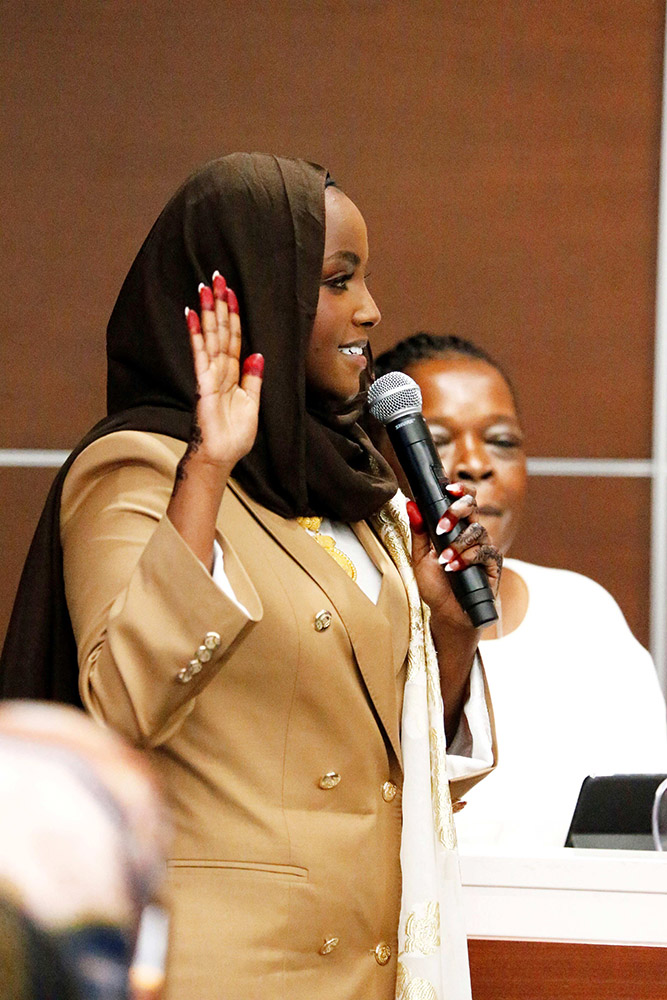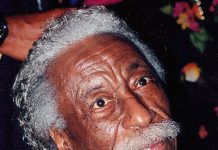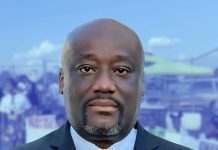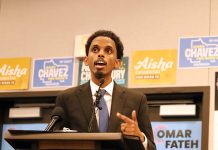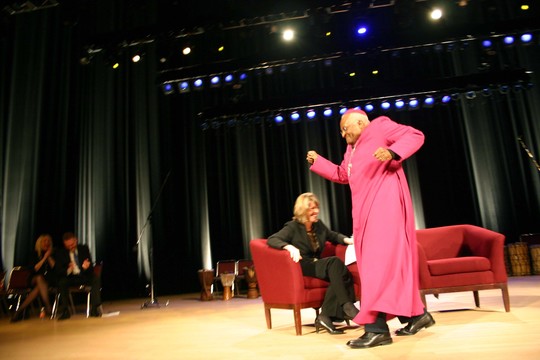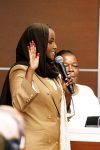
The city of St. Louis Park (SLP), Minnesota, has a population that is more than 80% white, according to United States Census Bureau data. But on Tuesday night, the make-up of the 150 or so people who showed up at the Council Chambers looked like half were people of color. Many of them came to see the making of history, as Nadia Mohamed was sworn in as the first Somali immigrant and at 27, the youngest person to become mayor of the city of around 47,000 located to the west side of downtown Minneapolis.
Thom Miller, who in 2019 vacated the at-large council seat that Mohamed won to begin her political career, spoke very highly of the new mayor, who he said he had known for five years.
“There’s all kinds of firsts happening tonight, but I’m going to talk about the character of Nadia Mohamed,” Miller said. “She’s incredibly emotionally intelligent. She’s navigated all kinds of systems and flourished.”
Miller attributed Mohamed’s success to what he said was her self-awareness, strong communicative abilities, and how well she picked up on the nonverbal cues of others.
“It’s in her DNA to help others,” he said.
Betsy Baudhuin, who came to City Hall with her children to see her husband, Paul Baudhuin, sworn in as a councilmember at-large, said she was a big fan of Mohamed.
“I think she’s wonderful,” Baudhuin said. “She has such a caring face. She’s young but deserving.”
Mohamed’s personal and family history is even more remarkable. In 2022, she was interviewed by a group of elementary school students as part of a program designed by Smithsonian Folkways recording artist Larry Long and adapted by St. Louis Park Schools.
When she was 10 years old, her parents brought her to the United States, along with her four siblings, including a twin brother.
Mohamed described to the students how conditions the civil war created – including the destruction of the education and healthcare systems, forced her family and many others to flee Somalia.
“A lot of the things that we had that made us a successful country, we lost during the war,” Mohamed told the children. “So, a lot of people said, ‘My children need a better future. They need to get an education. They need to do better than I am. I can’t keep being afraid for my life.’”
Minnesota is home to more than 86,000 people of Somali descent, more than any other state in the nation, according to Minnesota Compass. As their community grows, they have encountered challenges that come with being Black and Muslim in post-9/11 United States. To combat these challenges, many in the community have taken to politics, leading to the election of the likes of many Somali Americans into local, state, and national offices, as in the case of Rep. Ilhan Omar, who in 2018 became the first Somali and African immigrant to be elected to the U.S. Congress.
Mohamed’s is the quintessential story of the resilience of the refugees and immigrants. When she arrived in the United States, she could not speak English. Everything about U.S. culture was so foreign that it was difficult for her to figure out how everyday activities worked. Adjusting to American food was especially challenging. She remembers going to Cub Foods and thinking it smelled “so weird,” and feeling very cold as she walked through frozen foods aisle wondering why meat was frozen.
“[In Somalia] grocery stores are like fresh markets,” she said. “Everything is outside. Fruits are outside. Meats are outside. Everything is just fresh. There’s no frozen stuff.”
After settling, Mohamed was enrolled in the St. Louis Park public school system, which she credits with preparing her for the positions of leadership she would later hold. Cindy Blumer, her 5th Grade teacher at Cedar Manor School, said that even back then, she could tell that Mohamed was going to be doing “something big” because she had the ability to draw people towards her.
“I always wanted to do more for her because I knew she was so adamant and willing to learn,” Blumer said. “She is probably one of my most memorable students just because she made me a better teacher.”
According to Blumer, Mohamed was a quiet child. Mohamed said there were a lot of times she remained silent, even when she didn’t feel like things that were being done around her were right. But that began to change in 2015, when she graduated from St. Louis Park Senior High and went to Metropolitan State University to study human resources management.
“I think I waited up until college to start talking,” Mohamed said. “That’s when I found my voice.”
In her junior year in college, the St. Louis Park Human Rights Commission gave her with the Human Rights Award, which recognizes individuals, groups, organizations, or businesses that have made outstanding contributions toward increasing understanding and cooperation between people of different backgrounds within the city. The recognition motivated her to do more. She started going to community events. She attended parent-teacher committee meetings at local schools and had conversations about how schools can be more inclusive of students of color and their parents.
“[By] having those conversations and going to those community events, my voice got louder and louder and louder,” she said.
Even before she’d finished her bachelor’s degree, Mohamed began to participate in her community’s politics. That’s when Miller, the former at-large councilmember, noticed her and encouraged her to run for his seat. Even though Mohamed did not think she would win, she ran for the seat anyway. She won, and at 23, became the youngest person elected to the city council in the suburban city.
“That was probably the biggest shocker of my life,” Mohamed said.
In early 2023, Mohamed announced that she was entering the race to become mayor of St. Louis Park. In November, she was elected with 58.45% of the vote, becoming the first Somali immigrant and the youngest person ever elected to lead a city in the United States.
After City Clerk Melissa Kennedy finished administering the oath of office, the new mayor sat down at her seat, looked at the meeting notes before turning to the audience.
“Let’s pause,” Mohamed said. “That was amazing. I’m shaking right now.”
About Susan Budig
Susan is based in Minneapolis and reports on general assignments for Mshale with a focus on entertainment. In addition to reporting, she is also a writer, poet, teacher and coach.
- Web |
- More Posts(169)

